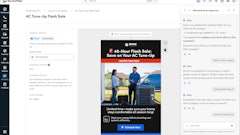Keeping good employees is one of the biggest headaches an employer can face. With the economy booming, the problem will only get worse. More construction activity means more job opportunities available. Workers have plenty of chances to jump ship and go to work for your competition.
The ability to retain competent workers has the potential to make or break your company. Luckily, there are ways to keep employees from walking when you need them most.
The first step in preventing voluntary employee departures is to figure out why employees would want to leave in the first place. One way to do this is to conduct exit interviews with departing workers. You may be surprised by what you find out. Beyond financial gains, reasons for quitting can include:
- conflicts with management personnel and/or co-workers;
- inadequate supplies and material to do the job right;
- poor communication, support or direction from field supervisors and/or managers;
- poor working conditions ;
- inadequate training;
- lack of career advancement opportunities.
Keeping workers happy and on the job often comes down to perception. If employees feel they are being treated fairly and with respect for their ideas and well being, they are more likely to remain loyal to the company.
Accessing information on wage rates and benefits packages has never been easier. You can bet your most savvy employees are monitoring what the market is willing to pay for their skills. If your compensation package falls short, consider the alternatives available. These can include providing matching funds for 401K savings plans; stock options; bonus plans based on performance; more flexible work schedules, etc.
Other "perks" can prove just as effective for building employee loyalty. Common incentives include tuition reimbursement for job-related coursework; rewards for performance (i.e., cash incentives, trips, company apparel); health club memberships; child-care subsidies; additional paid time off; access to company vehicles; a clothing allowance, etc.
Opportunity for career development is another effective tool for retaining workers. Annual reviews provide the perfect chance to determine an individual's interests and set them on a possible career path. You can then steer them toward "mentors" within the company who can provide guidance and/or instruction in their area of interest. Also make sure appropriate training is available, both in house and from outside sources.
Communication is another big factor when it comes to job satisfaction. Make sure employees are kept aware of what's happening on the project(s) where they are working, as well as other active projects handled by the company. Provide information about overall company performance. And communicate any changes likely to affect their job, both directly and indirectly.
Communication also means soliciting input from workers on how to better manage a task or improve work flow. Employees who believe management listens to - and acts upon - their ideas are more likely to stick with you for the long term.















